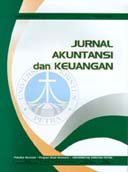The Effect of Organizational Culture and Good Corporate Governance Mechanism on Human Resource Disclosure
 :
:
https://doi.org/10.9744/jak.22.2.62-71
Keywords:
Organizational culture, institutional ownership, independent commissioner, human resource disclosureAbstract
Human resource is an important and valuable asset to reach competitive advantage for every firms. In the banking and insurance firms, human resource have an important role that is irreplaceable in the operational process of the firms. Human resource disclosure is an activity to disclose information about recruitment process, benefits, training and development program for employee. Therefore, human resource disclosure may provide additional information for the management and all the stakeholders in the development process of decision making. Factors that may affect the human resource disclosure are organizational culture, institutional ownership, and independent commissioner. The objective of this study is to investigate the effect of organizational culture, institutional ownership, and independent commissioner to human resource disclosure. The research’s object are banking and insurance companies that listed in Indonesian Stock Exchange in 2016-2018, there were 55 companies which have been selected by purposive sampling technique. Data were analysed by using multiple regression analysis. Based on the analysis, the results show that organizational culture has positive impact to human resource disclosure. Therefore, institutional ownership and independent commissioner does not affect the human resource disclosureReferences
Ahmad, A.C. and Jusoh, M.A. (2014). Insti¬tu-tional ownership and market based perfor-mance indicators. Procedia Social and Beha-vioral Sciences, 164, 477-485.
Alawi, N.A. (2018). Human resources disclo-sure: an exploratory study of the quality in Qatar. World Journal of Entrepreneurship, Management and Sustainable Development, 15(1), 84–95. https://doi.org/10.1108/wjemsd-01-2018-0010.
Bowrin, F. (2018). Human resources disclo-sures by african and carribean Journal of Applied Accounting Research, 11. https://doi. org/10.1108/jaar.2010.37511aaa.003.
Chusnah, F.N., Zulfiati, L., and Supriati, D. (2014). Pengaruh intellectual capital terhadap kinerja perusahaan dengan strategi sebagai pemoderasi. Simposium Nasional Akuntansi (SNA) XVII: Mataram.
David, F.R., dan David, F.R., Pendekatan Ke-unggulan bersaing, edisi 15, Salemba Empat., Jakarta, 2016.
Effendi, M.A., The Power of Good Corporate Governance: Teori dan Implementasi, Salem¬ba Empat., 2016.
Islahuzaman. (2006). Akuntansi sumber daya manusia dan kendala penerapannya. Jurnal Bisnis, Manajemen, dan Ekonomi, 8(1).
Jensen, M. C., dan W. H. Meckling. (1976). Theory of the firm: Managerial behavior, agen-cy costs and ownership Structure. Journal of Financial Economics, 3(4), 305-360
Kartikasari, Y.D. (2016). Pengaruh good corporate governance dan modal intelektual terhadap kinerja keuangan pada perusahaan sektor keuangan yang terdaftar di bursa efek indonesia tahun 2011-2015. (Skripsi, Program Studi Akuntansi Jurusan Pendidikan Akun-tansi Fakultas Ekonomi Universitas Negeri Yogyakarta, Yogyakarta, Indonesia). Didapat dari http://journal.student.uny.ac.id/.
Kaur, S., Raman, V.A., and Singhania, M. (2016). Impact of corporate characteristics on human resource disclosures. Asian Review of Accounting, 24(4), 390–425. https://doi.org/ 10.1108/ARA-09-2014-0103.
Koesmono, T. (2005). Pengaruh budaya orga-nisasi terhadap motivasi dan kepuasan kerja serta kinerja karyawan pada sub sektor industri pengolahan kayu skala menengah di Jawa Timur. Jurnal Manajemen Dan Wira-usaha, 7(2), 171–188. https://doi.org/10.9744/ jmk.7.2.pp.171-188.
Kreitner, R, and A. Kinicki., Organizatinal Beha¬¬viour, Fifth Edition, Mc Graw Hill., Jakarta, 2005.
Lukviarman, Corporate Governance. Solo: PT. Era Adicitra Intermedia, 2016.
Mayo. (2000). The role of employee develop-ment in the growth of intellectual capital. Personal Review, 29(4). http://www.emerald-library.com.
Mishra, L., and Mishra, R. (2017). Human resource disclosure and it’s association with corporate Attributes. Global Journal of Mana-gement and Business Research, 17(5), 9–20.
Mukhtaruddin, Relasari, dan Felmania. (2014). Good corporate governance mecha-nism, corporate social responsibility disclosure on firm value: empirical study on listed company in Indonesia Stock Exchange”. International Journal of Finance dan Account¬¬¬ing Studies, 2 (1)
Ojokuku, R.M., and Oladejo, K.S. (2017). Firms characteristics and human resource disclosure in Nigerian Quoted Manufacturing Compa¬nies. International Journal of Finance and Management in Practice, 5(1), 10–22.
Petera, P., and Wagner, J. (2017). Human resources disclosure among companies in Czechia. Social Responsibility Journal, 13(4), 743–761. https://doi.org/10.1108/SRJ-07-2017-0123
Purnama, J.B. (2016). Optimalisasi sumber daya manusia. Jurnal Manajemen Pendidik¬an, 12(6).
Roos, Johan., Goran Roos, Nocola C. Drago-netti, and Leif Edvinsson, Intellectual Capital Navigating the New Business Landscape, MacMillan Press Ltd., London, 1997.
Sawarjuwono, T., dan A. P. Kadir. (2003). Intellectual capital: perlakuan, pengukuran dan pelaporan. Jurnal Akuntansi dan Ke-uangan, 5(1), 35-57.
Shaw, John. C., Corporate Governance and Risk: A System Approach, John Wiley and Sons, Inc., New Jersey, 2003.
Solechan, A. (2017). Pengaruh efisiensi modal intelektual terhadap kinerja keuangan per-usaha¬an di Indonesia. Jurnal Kajian Akun-tansi, 1(1), 83-96.
Tahir, S. H., Saleem, M., and Arshad, H. (2015). Institutional ownership and corporate value. Praktični Menadžment, 6(1), 41-49.
Wen, Y. and Jia, J.Y. (2010). Institutional ownership and managerial ownership in Bank Holding Companies. International Review of Accounting, Banking and Finance, 2(1), 9-22.
Widodo, N.M. (2014). Pengaruh karakteristik perusahaan terhadap pengungkapan akun¬tan-si sumber daya manusia. Simposium Nasional Akuntansi XVII: Lombok.
Yulianto and Pratiwi. (2016). Pengaruh struk-tur kepemilikan dan dewan komisaris inde-penden terhadap biaya keagenan perusahaan yang masuk dalam Indonesia Most Trusted Companies. Management Analysis Journal, 5(3).
Downloads
Published
How to Cite
Issue
Section
License
Authors who publish with this journal agree to the following terms:
- Authors retain the copyright and publishing right, and grant the journal right of first publication with the work simultaneously licensed under a Creative Commons Attribution License that allows others to share the work with an acknowledgement of the work's authorship and initial publication in this journal.
- Authors are able to enter into separate, additional contractual arrangements for the non-exclusive distribution of the journal's published version of the work (e.g., post it to an institutional repository or publish it in a book), with an acknowledgement of its initial publication in this journal.
- Authors are permitted and encouraged to post their work online (e.g., in institutional repositories or on their website) followingthe publication of the article, as it can lead to productive exchanges, as well as earlier and greater citation of published work (See The Effect of Open Access).<a href="http://creativecommons.org/lice














